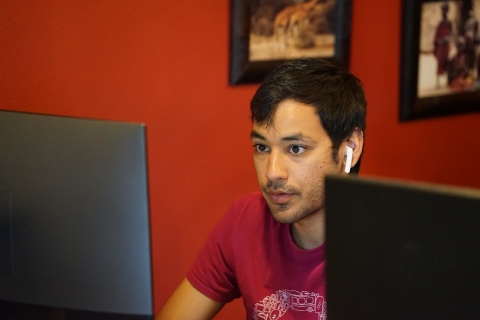Not all software is created the same—nor is it easily adaptable for professionals studying and working in academic fields.
According to ARCS Scholar Samuel Grayson, modern science uses custom-built software, which is written and produced by trained engineers to ensure a specific set of outcomes and incentives are achieved. These products are most often used by researchers in the STEM fields and by companies, such as Google and Microsoft.
However, people who study academia will often “have to engineer the software themselves in order to get their research done,” Grayson explains. “They use the same tools and techniques that are used to improve code quality in the software engineering industry—but those upgrades are never used to enhance academic software. My question is why not?”
Grayson, a PhD student studying computer science at University of Illinois at Urbana – Champaign, is forging a path into relatively unchartered territory by creating academic-centered software systems based on social sciences.
In simple terms, Grayson’s goal is to “reform academia.”
His focus includes students and professors who conduct research in media studies, data sciences, and informational sciences—three areas that analyze huge amounts of data sets that bring people and science together. For instance, software that helps farmers predict what crops will grow well during a certain year.
ARCS Scholar Samuel Grayson, right, and Neil Patil collaborate on creating
software at the Massachusetts Institute of Technology (MIT) in 2019)
(Courtesy: Samuel Grayson)
As part of this research, Grayson will study existing software engineering practices, determine which are most useful to academic values, identify which tools best support those values, and how to share those tools with the community. He is also working on adapting academic software already available and will provide simple instructions to teach people how to use the tools effectively.
Academic students and professionals are evaluated by their publications, not code quality, and often don’t publish the software they used to write their paper. Grayson hopes to change that so, “the software is published in a different venue where people can look at it and potentially reuse it.”
As a self-proclaimed “bored student” in a seventh-grade math class, a “self-imposed” experiment taught Grayson to program code using a TI-84 calculator.
“The real capability of those calculators is programming and I realized graphing was just one result of it. So, during class I programmed my calculator to play games, like tic-tac-toe or generate puzzles using numbers,” he remembers. “I became excited about programming because I was able to create and build something—and all the materials were right in front of me.”
An ARCS Scholar award recipient from 2019-2021, Grayson says the support changed the course of his career. “I realized I wasn't passionate about what I was initially studying. The ARCS award gave me flexibility to switch advisors and PhD topics. ARCS also helped me meet people from other universities who are in my target audience, such as biologists, chemists, data scientists, and journalists. Those connections will help advance my research,” he adds.
Grayson hopes to work on his research full-time after graduate school as a professor or scientist. He also hopes his work influences a new generation of students to follow in his footsteps and further his academia software research.

ARCS Scholar Samuel Grayson, left, and Caroline Shi collaborate on
creating new software at the University of Texas, Dallas in 2016.
(Courtesy: Samuel Grayson)

